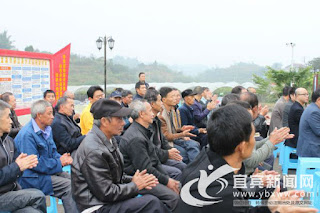An essay in China's Farmers Daily last week assured Chinese communist party cadres that Xi Jinping's directive to improve peoples' living standards is entirely consistent with Marxism by pointing to Marx's tenet that "struggle" is all about peoples' "material interests." The essay skipped over some other glaring contradictions: a communist party founded on revolution and class struggle has adopted "order," "stability," and "harmony" as its main watchwords, and Chinese communist leaders are grafting capitalist mechanisms on to socialist institutions to forestall any possible uprising in the countryside.
The Farmers Daily writer elaborated on Xi Jinping's assertion--in his speech celebrating 40 years of China's economic reforms--that improving citizens' quality of life must be the focus of the communist party's struggle. "Respecting the main position of people," ensuring they enjoy a wide range of "effective democratic rights," letting them share in the benefits of development, and promoting the peoples' participation in development are consistent with the basic views of Marxism, the Farmers Daily author intoned.
Chinese communist party officials are engaged in an adventurous--but mostly unnoticed--"deep reform" of rural institutions: ambitious projects to clean up the socioeconomic mess in the long-neglected countryside and engineer a hybrid merger of socialist and capitalist institutions. Socialist institutions--fuzzy "collective" ownership, State domination of land and banking, concentration of resources in urban areas and barriers to urban citizenship--created the problems in the first place, but the communist party's solution is to double down on these institutions designed 60 years ago and fuse them with capitalist market mechanisms instead of allowing something new to take their place. The Farmers Daily writer's bottom line is that the countryside must be "harmonious" and "orderly" under a governance system featuring a "complete communist party organization."
 |
| Rural people attend launch of a project promoting party members' role in setting up rural cooperatives |
 |
"Party branch + cooperative" organizational chart shows farmer cooperative leadership committees
under the direction of communist party committees.
|
The "deep reforms" are also political--they aim to establish a grass roots political system that gives common people a voice in their own governance by establishing networks of village committees, cooperatives, and service organizations with elections, boards, and oversight. Although it's described as "self-governance" (自治), these organizations are not allowed to pop up in a chaotic, organic fashion. They are to be systematically set up by local branches of the communist party and placed under the party's supervision. Numerous online articles instruct low-level cadres on how to carry out a "Party Branch + Cooperative" strategy. For example, a November article in the magazine China Farmer Cooperatives includes an article, "Strengthening Grass Roots Party Organization by Developing Farmer Cooperatives" and "The Influence of Farmer Cooperatives on Grass Roots Governance in Ethnic Minority Regions."
Framing the complex challenge of strategizing rural governance, the Farmers Daily author explained that rural people have three identities: as citizens of the State, as members of collective organizations, and as members of village communities. The "deep reform" of rural institutions creates a new set of collective organizations that are both political and economic--farmer cooperatives, family farms, farmer service organizations, and village social organizations. Establishing "rule by law" (法治) will attempt to uncouple institutions of rural governance--village elections, committees and supervisory boards--from control by powerful individuals, clans, and triads who currently have a firm grip on many villages.
 |
| TV report on village cooperative dividend distribution organized by local communist party |
Actual discussion of Marxist theory in China is almost always limited to a series of slogans, aphorisms, and toss-off references to Xi Jinping's Socialism for Chinese Characteristics for a New Era. One reason for avoidance of deeper discussion is the risk of uncovering contradictions in 21st-century Chinese communism that are not unlike the contradictions Marx saw in 19th-century capitalism.
 |
Communist party inspection team discusses a farmer cooperative in Hainan Province
while an actual farmer looks on with curiosity from the door to the pig barn.
|
 |
Kicking off a "high-standard field" project to upgrade 2600 mu of land in Shandong demonstrates a
"party branch + cooperative + company" that engages China's biggest peanut oil company.
Five villages are promised 250,000 yuan in income to their collectives annually.
|
Chinese leaders are very mindful of the country's history of rural uprisings that brought down many dynasties that came before them. In dialectic terms, they are on guard against any "antithesis" in the form of a movement outside their control that might threaten "order," "harmony," and "stability"--whether it be Falun Gong, Muslim or Christian sects, multi-level marketing, triads, peer-to-peer lending, genuine farmer organizations. The Chinese communist party wants to manufacture its own "synthesis," not let it appear organically in Hegelian fashion.
 |
Diagram illustrates how communist party organizes farmer cooperatives and
engages them with the supply and marketing cooperatives organization to
increase incomes for farmers.
|



1 comment:
"Actual discussion of Marxist theory in China is almost always limited to a series of slogans, aphorisms, and toss-off references".
For 90% of people, slogans, aphorisms, and toss-off references are all they want. For the remaining 10% there are a dozen journals that discuss Marx in length and depth.
Post a Comment